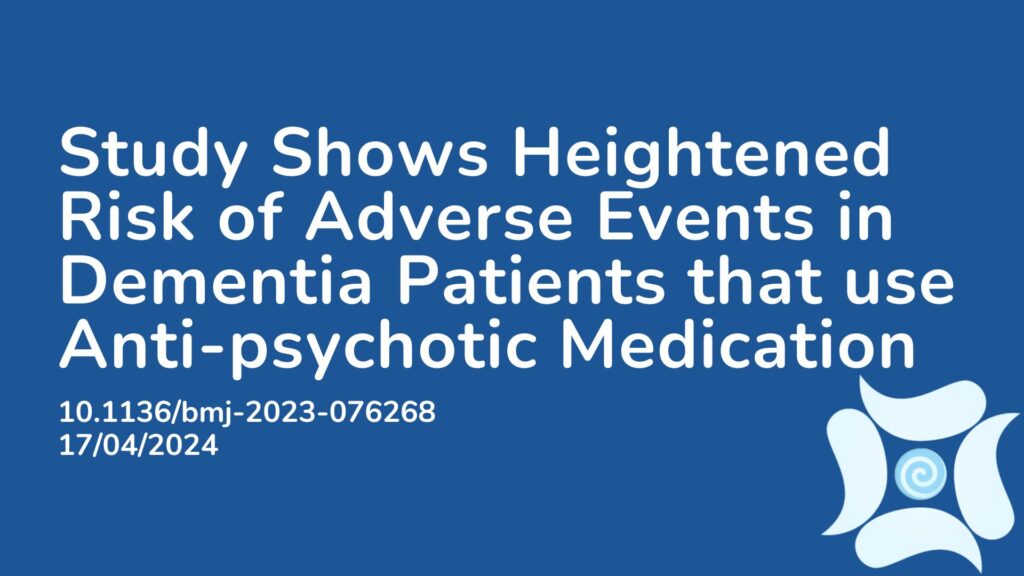Summary:
Dementia is a neurological condition that generally presents with progressive cognitive decline and behavioral symptoms like apathy, depression, and aggression. Anti-psychotics are commonly prescribed to manage these symptoms, despite safety concerns. Guidelines from the UK advise cautious use of anti-psychotics, reserving them for severe symptoms only, as the risks associated include stroke, pneumonia and death. Evidence on other adverse effects like heart issues and fractures is limited, highlighting the need for further research. The aim of this study was to explore the potential risks of various adverse events linked to the usage of anti-psychotic medications in individuals diagnosed with dementia. The study involved adults aged 50 years and above diagnosed with dementia 1998 and 2018. The findings showed that anti-psychotic use increased risk for various outcomes, such as pneumonia, acute kidney injury, venous thromboembolism, stroke, fracture, myocardial infarction, and heart failure. Within 90 days of initiating treatment, the cumulative incidence of pneumonia among anti-psychotic users was also higher compared to the non-user cohort. This study highlights that anti-psychotic use in adults with dementia correlates with increased risks of various adverse events and that use should be limited to severe symptomatology.
Abstract:
Objective: To investigate risks of multiple adverse outcomes associated with use of antipsychotics in people with dementia. Design: Population based matched cohort study. Setting: Linked primary care, hospital and mortality data from Clinical Practice Research Datalink (CPRD), England. Population: Adults (≥50 years) with a diagnosis of dementia between 1 January 1998 and 31 May 2018 (n=173 910, 63.0% women). Each new antipsychotic user (n=35 339, 62.5% women) was matched with up to 15 non-users using incidence density sampling. Main outcome measures: The main outcomes were stroke, venous thromboembolism, myocardial infarction, heart failure, ventricular arrhythmia, fracture, pneumonia, and acute kidney injury, stratified by periods of antipsychotic use, with absolute risks calculated using cumulative incidence in antipsychotic users versus matched comparators. An unrelated (negative control) outcome of appendicitis and cholecystitis combined was also investigated to detect potential unmeasured confounding. Results: Compared with non-use, any antipsychotic use was associated with increased risks of all outcomes, except ventricular arrhythmia. Current use (90 days after a prescription) was associated with elevated risks of pneumonia (hazard ratio 2.19, 95% confidence interval (CI) 2.10 to 2.28), acute kidney injury (1.72, 1.61 to 1.84), venous thromboembolism (1.62, 1.46 to 1.80), stroke (1.61, 1.52 to 1.71), fracture (1.43, 1.35 to 1.52), myocardial infarction (1.28, 1.15 to 1.42), and heart failure (1.27, 1.18 to 1.37). No increased risks were observed for the negative control outcome (appendicitis and cholecystitis). In the 90 days after drug initiation, the cumulative incidence of pneumonia among antipsychotic users was 4.48% (4.26% to 4.71%) versus 1.49% (1.45% to 1.53%) in the matched cohort of non-users (difference 2.99%, 95% CI 2.77% to 3.22%). Conclusions: Antipsychotic use compared with non-use in adults with dementia was associated with increased risks of stroke, venous thromboembolism, myocardial infarction, heart failure, fracture, pneumonia, and acute kidney injury, but not ventricular arrhythmia. The range of adverse outcomes was wider than previously highlighted in regulatory alerts, with the highest risks soon after initiation of treatment.
Article Publication Date: 17/04/2024
DOI: 10.1136/bmj-2023-076268



